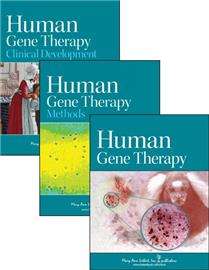Promising results reported in study of AAV-based gene delivery to treat methylmalonic acidemia

A new study in patients with the inherited metabolic disorder methylmalonic academia (MMA) found lower than expected levels of antibodies against the adeno-associated viral (AAV) vectors being developed for gene therapy to replace the enzyme (MUT) that is deficient in MMA. These results, and especially the absence of AAV antibodies in most patients who completely lack the MUT enzyme and have not had a liver transplant—those in greatest need of improved therapies—has encouraging implications for gene delivery as a treatment for MMA, as described in an article in Human Gene Therapy.
Elizabeth Harrington, Jennifer Sloan, Irini Manoli, Randy Chandler, Charles Venditti, and Peter McGuire, National Human Genome Research Institute, National Institutes of Health (Bethesda, MD), and Mark Schneider, Roberto Calcedo, and James Wilson, Perelman School of Medicine, University of Pennsylvania (Philadelphia), coauthored the article entitled "Neutralizing Antibodies Against Adeno-Associated Viral Capsids in Patients with mut Methylmalonic Acidemia (MMA)".
AAV is proving to be an effective gene transfer vehicle for systemic gene delivery. The authors have developed and tested AAV vectors that carry the mouse mut gene and have reported promising results of gene transfer in a mouse model of MMA. They have also developed an AAV vector to deliver the human MUT gene. The presence of pre-existing antibodies to AAV capsid proteins can trigger an immune reaction against the vector and interfere with delivery of the therapeutic gene.
"The presence of neutralizing antibodies in some patients is one of the few remaining obstacles to successful correction of genetic diseases with AAV vectors," says Editor-in-Chief Terence R. Flotte, MD, Celia and Isaac Haidak Professor of Medical Education and Dean, Provost, and Executive Deputy Chancellor, University of Massachusetts Medical School, Worcester, MA. "The observation that anti-AAV antibody levels are lower than expected in MMA patients bodes well for the future success of AAV-based gene therapy with this disorder."
More information: Elizabeth A. Harrington et al. Neutralizing Antibodies Against Adeno-Associated Viral Capsids in Patients with Methylmalonic Acidemia , Human Gene Therapy (2016). DOI: 10.1089/hum.2015.092


















